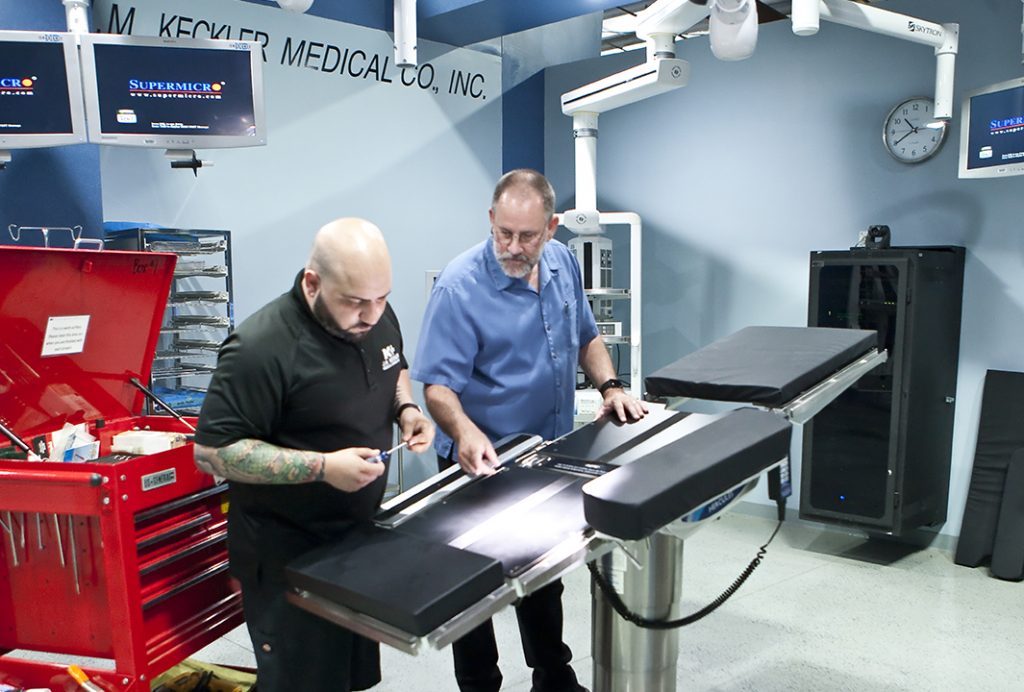
Keckler Medical is known for the quality of the medical equipment and supplies it has sold to hospitals, surgery centers and doctor’s offices for nearly five decades. The company also has earned a sterling reputation for customer service.
Keckler Medical’s motto is “it’s all about what happens after the sale.” Those words are borne out each time a customer reaches out to ask for help with a piece of equipment or product that has been purchased.
It is also why we formed J.M. Keckler Bio Medical Service, Inc., which is committed to provide high-quality, high-functioning services through long-term maintenance contracts or one-time responses.
When customers call, here are the top five troubleshooting questions we ask:
Q.
Is the equipment plugged in and does it have power?
It sounds simple, but you’d been surprised how often this comes up, almost always in relation to operating rooms. ORs typically have many cords and cables running across the floors that can make it difficult to see if all the machines are plugged in. That’s why one of the first questions we ask is, “Is the equipment plugged in at both ends?”
Good cable management can help reduce the stress on your cables. It also is an important part of creating an effective and efficient operating room for physicians and hospital staff. Avoid contouring cables in a way that may create undue stress at the connection point to the equipment or power outlet.
Q.
How long have the issues been happening or how long has the equipment been down or acting up?
It is important to know when the equipment first started having issues. As we review the timeline of issues, we can troubleshoot the equipment more effectively and possibly come up with the solution more quickly. We encourage all customers to reach out to us by phone or email at the first sign of any problem.
Q.
Have you changed how you are using your equipment?
Changing how you use a piece of equipment may result in functions that you have not previously experienced. If that’s the case, we recommend that you consult the owner’s manual, a certified technician or the manufacturer for specific operating directions.
Changes in protocols, team members or auxiliary equipment also can affect the proper function of your equipment. It’s possible that all that is needed is additional training for those new to the process.
In the case of sterilizers, sometimes the water or steam the sterilizer needs to be tested to ensure proper water quality. Cart washers also are sensitive pieces of equipment. Issues sometimes pop up because of changes to the boilers or heat exchangers that heat the water, or the water treatment systems.
Q.
Have you recently replaced any parts or made any mechanical changes to your equipment?
When changing parts on equipment, there sometimes are unforeseen issues that cause other parts on the equipment to fail. That could indicate compatibility issues between new and old parts, or the new part could cause stress on an older part.
Our JMK Bio Medical Service technicians welcome an opportunity to help customers in these situations. If equipment is still under warranty, customers also can call the manufacturer for assistance.
Q.
Are you and your team members trained on the proper use of the equipment?
Medical equipment is a complex piece of machinery. Reading and reviewing the owner’s manual and implementing proper training for all who use the equipment will help everyone understand its full ability. If you don’t have a clear understanding of how the equipment works and how it can be used most efficiently, reach out to a certified technician.
Again, our team at JMK Bio Medical Service is ready to help. We recognize the vital nature of the medical industry and its impact on the communities it serves. Our purpose is to position each of our customers so they can provide the best medical care they can in every single case.
Do you have a question for JMK Bio Medical Service team? If so, please call (209) 847-4100.
